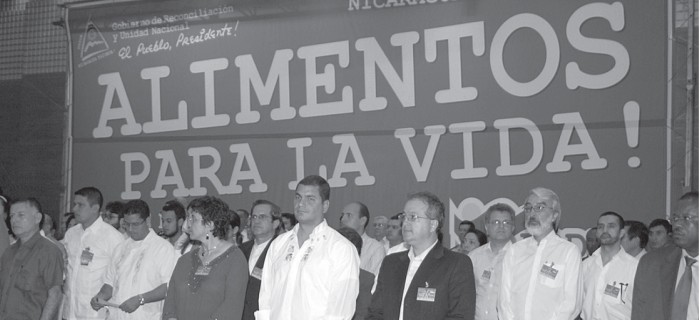Opening the Door to Food Sovereignty in Ecuador
By Karla Peña
In an unprecedented move, Ecuador established Food Sovereignty in their new constitution, in September of this year. Now work has begun to draft a Food Sovereignty Law for possible approval in February. The constitution aims to promote food sovereignty by transforming the national agro-food system; introducing organic and ecological technologies for sustainable agricultural production, adopting fiscal and redistributive policies to increase resources for farmers, protect the national economy from food import dependency, and prohibit the use of biotechnology and genetically-modified seeds harmful to human and environmental health.
The draft law will conserve agricultural, wild and genetic biodiversity by declaring their land free of genetically engineered (GE) seeds and crops. Extraction of non-renewable resources is prohibited in protected areas, and production of monocultures will be avoided for rehabilitation of the soil. The state will also protect the intellectual property of collective work based on national biodiversity and begin to recognize the Rights of Nature (Article 71-74).
There never was a better time to end hunger—equitably, sustainably, and permanently.
Food Sovereignty in Ecuador
The Agrarian Roundtable, composed of national and international non-governmental organizations (NGO’s) participated in drafting the food sovereignty section of the Constitution. The majority of the Roundtable’s proposals were implemented by the National Assembly in the new Constitution. Community-based organizations in Ecuador had significant influence in shaping this public policy because of civil participation in the legislative process. The National Confederation of Farmers, Indigenous and Afro Ecuadorian Organizations (FENOCIN) is an inter-cultural, interdisciplinary, community-based movement working towards an equitable Agrarian Reform in Ecuador. FENOCIN and other organizations hold open forums to gather knowledge and inquiries from the people. The information is formulated into a proposal and distributed to legislative representatives or working roundtables.
FENOCIN representatives, along with other members of the Agrarian Roundtable, are currently working on proposals to implement the Food Sovereignty Law. These organizations have proposed creating a National Council on Food Sovereignty to democratize the process of drafting legislation and implementing of Food Sovereignty. They also want the government to define tenancy and create a National Land Fund to aid in distributing productive resources, including land. Expropriation would only take place in lands not serving their social function. What they are proposing is similar to the land laws in Brazil which have allowed the MST Landless Workers Movement to continue to organize.
Moving Food Sovereignty from the constitution into practice will still take considerable effort from the grassroots. Galo Chiriboga, who negotiated the Ecuador/U.S. free trade agreement, and has no agricultural experience, has been appointed to write up the government proposals for food sovereignty. The government has solicited Maria Yumbla, a member of Latin American Scientific Society of Agroecology, to help draft and introduce the concept of Agroecology into the Food Sovereignty Law. However, there is no guarantee that the government will accept her draft.
Stay in the loop with Food First!
Get our independent analysis, research, and other publications you care about to your inbox for free!
Sign up today!Inter-cultural solidarity, the formation of grassroots movements, and community involvement in legislation, together led to the resurrection of human rights in Ecuador and provides a universal reminder of the valuable role of civic activism. This first ever food sovereignty language in a national constitution is an incredible opening, one that will require activism from below as it now moves into the thorny stages of implementation.
Also in this issue of News & Views:
- Food and Financial Crises


 Help Food First to continue growing an informed, transformative, and flourishing food movement.
Help Food First to continue growing an informed, transformative, and flourishing food movement.




